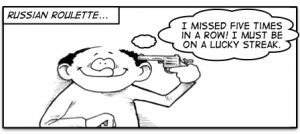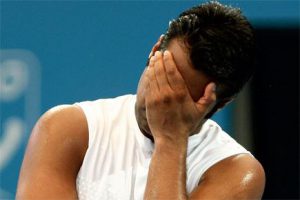
Do Losing Streaks Really Exist?
‘Heaven, I’m in heaven, and the cares that hung around me in the week seem to vanish like a gambler’s lucky streak…’
If you’re a regular bingo player, you’re almost bound to have had at least one spell where it seems like your numbers just never come up. You may tell yourself that if you just carry on playing, your luck is bound to turn – and yet it doesn’t.
The problem with this is that bingo is meant to be fun – and there’s no fun at all in losing one game after another. If you’ve hit a bad losing streak and it’s getting you down, something needs to change.[1]
Bingo is a game of chance and there are no magic formulas for winning. If you’ve been playing the same bingo game for some time and losing again and again, a feeling of desperation can creep in which it’s important to tackle before it becomes a problem. That voice in your head which says “I’ll just try one more card – my luck’s bound to change eventually!” is very persuasive – but for a number of reasons it may be best, at this stage, to take a break.
Most people take up playing online bingo because it’s entertaining and very sociable – the chat facility on most sites is very active. When it starts to become a source of stress, disappointment and money loss, it’s time to take a step back. So, before the losing streak really starts to cost you money and get you down, why not find out if any of your bingo buddies are online? Sharing a bad run of luck can help to put things in perspective. Check out our Responsible Gambling page for more tools in how to deal with these feelings.
Another way to deal with things may involve shutting the lid on your laptop, going away and having a drink and something to eat, or going out for a walk before trying again. If bingo stops being a fun way to relax and starts to become upsetting or a problem, it may be time to take a break from the game and get things into perspective.
There’s another reason to take a breather in the midst of a ‘losing streak’. It’s a well-known phenomenon that when we lose a certain number of times, it makes us all the more certain that we’re bound to win soon. This is the thinking that can lead people to gamble more and more, thinking that probability is bound to start working in their favour.
Probability just doesn’t work like that. Let’s take a look at the evidence.
Do losing streaks exist?
Is there really such a thing as a losing streak? Perhaps not surprisingly, most mainstream scientists, from statisticians to psychologists, say ‘no’. Bingo, like roulette and many other forms of gambling, relies on pure chance and is governed by the laws of probability. The chance of winning or losing remains the same every time you spin the wheel or buy a bingo card.

However many times we tell ourselves this, though, it’s very difficult not to see patterns in the way the numbers come in or the dice fall. Something called the ‘Gambler’s Fallacy’ was identified as long ago as 1796 by a French philosopher called Pierre-Simon Laplace.[2] Talking about the way in which expectant fathers in those less enlightened times tried to load the dice of conception in favour of having a male heir, he wrote:
“I have seen men, ardently desirous of having a son, who could learn only with anxiety of the births of boys in the month when they expected to become fathers. Imagining that the ratio of these births to those of girls ought to be the same at the end of each month, they judged that the boys already born would render more probable the births next of girls.”
The fallacy refers to the mistaken belief that you can have an influence over random events. For instance, if you toss a coin four times and the result is ‘heads’, you might believe that it is more likely that the fifth toss will result in ‘tails’. This is not the case. Every time you toss a coin the result is just as likely to be heads as tails.
The Gambler’s Fallacy is also known as the Monte Carlo Fallacy, after a really extreme example that happened in the Monte Carlo Casino in 1913, when roulette players lost millions of francs by betting against black, only to see the ball fall on that colour no fewer than 26 times in succession.[3] They were led astray by the idea that the more often black came up, the more likely it was that the next spin of the wheel would come up with a red.
While the probability is that wins and losses will balance themselves out over the long term, we are fooling ourselves if we think this can happen in the short term.
If everything is so random, what does this say about the concept of the ‘lucky streak’ or its more down-in-the-mouth opposite, the losing streak?
Streaky sports
Probability can come up with some very surprising results, which are very hard to reconcile with the idea of random outcomes. It would be difficult to convince an ardent baseball fan that the awe-inspiring run of wins scored by the legendary Joe di Maggio were just a matter of random chance, and that he wasn’t on some sort of ‘winning streak’. In 1941 di Maggio hit winners in 56 consecutive games – the most incredible, probability-defying run to happen in the history of American sport.

The title of ‘longest winning streak’ in any individual sport goes to Pakistani squash player and world champion Jahangir Khan, who won 555 games in a row between 1981 and 1986.
Even though both Khan and di Maggio were outstanding sportsmen, these incredible unbroken runs stretch the limits of probability – but they do not break them. American statisticians have pored over years of sports numbers and found absolutely no evidence of the existence of streaks.
However, a recent Harvard University study has found that there may be a limited ‘streak effect’ at work in some sporting successes[4] where confidence and ‘success breeding success’ has an effect on player performance. Looking at baseball games from the 2012-13 season, the researchers were able to see that players who had been successful recently tended to take shots from further away, to tackle tighter defences and throw more challenging shots.
The loser effect
In sports, however, where player ability as well as chance events has an influence on outcomes, there is more than statistical probability at play in the losing streak. Losing again and again can have a terrible effect on team morale, which in turn can make losing the next match more likely.[5] Studies into what sports scientists call ‘the loser effect’ show that a series of losses can make players more cautious and less likely to succeed the next time.
Streaky thinking
In the sporting arena, where skill is as important as luck, it does seem as if some evidence is being found for the ‘hot hand’ or lucky streak, or their opposites. This does not, however, apply to random processes or games of chance. Random processes such as slot machines and stock markets throw up occasional thrillingly rewarding results. The danger is falling for the illusion that there is some pattern to this, or that we can control it in some way.
Yet, whatever the scientific explanations are for a run of bad luck or a losing streak, there appears to be something deep within our brains that attracts us to the idea. Fascinatingly, the allure of streaky thinking is not confined to the human brain, and recent research suggests that it is not just a cultural phenomenon but a way of thinking that has evolved in us.

In 2014 scientists from Rochester University in the USA carried out the first study in non-human primates of this erroneous way of thinking[6]. Using a specially adapted gambling game they found that monkeys also have a tendency to see patterns that don’t exist.
The game got the monkeys to choose between two alternatives, getting a reward for the right answer. There were three variations, two of which had clear patterns (such as the correct answer repeating on one side) and one of which was totally random. The monkeys learned quickly to guess the correct answer in the variants with clear patterns. However, they also continued to make choices in the random game as if they expected a ‘streak’.
If a belief in ‘streaks’ is misplaced, why is it hard-wired into our brains and those of our primate cousins? The Rochester study suggests that it may have developed to help our ancestors forage for food. Food in the wild is not distributed randomly and, says one of the authors, neuroscientist Benjamin Hayden: “If you find a nice juicy beetle on the underside of a log, this is pretty good evidence that there might be a beetle in a similar location nearby, because beetles, like most food sources, tend to live near each other.”
We also love patterns, something that is related to the reasons why we like music and crossword puzzles.
Final Thoughts
It’s clear that the feeling of being on a losing streak or a winning streak runs very deep, and if you’re a footballer or a tennis player the feeling of doom that successive losses brings can have an effect on how you play next time. But if your game is bingo, the evidence is clear – the outcome is totally random. You may have lost 20 times in a row, but this doesn’t make it any more likely that you’ll win next time.
As we’ve said earlier, if a run of losses is getting you down, it may be time to take a break, rather than risk ‘throwing good money after bad’ and taking all the fun out of the game into the bargain.
When you come back to play again, it might be better to try playing a completely different game, and luckily all the main bingo sites provide a huge range of options. Some of them also offer bonuses to help you get your mojo back if the cards haven’t fallen your way.
Above all, remember that bingo is a game of chance that is meant to be sociable and fun – and don’t let a few lost games lead you to think you’re on a losing streak.

[1] http://www.playcasino.org/ways-to-curve-a-losing-streak-at-online-bingo-sites/
[2] Barron, Greg; Leider, Stephen (2010). “The role of experience in the Gambler’s Fallacy”. Journal of Behavioral Decision Making 23 (1): 117–129.
[3] Darling, David (2004). “Roulette”. The Universal Book of Mathematics: From Abracadabra to Zeno’s Paradoxes. John Wiley & Sons. p. 278.
[4] https://www.bostonglobe.com/ideas/2014/02/09/the-hot-hand-might-real-after-all/N8V34bGLWhPqk0Sx9yoHWI/story.html
[5] Peterson, Dan (2008-10-06). “The Reality of Momentum in Sports”. Live Science.